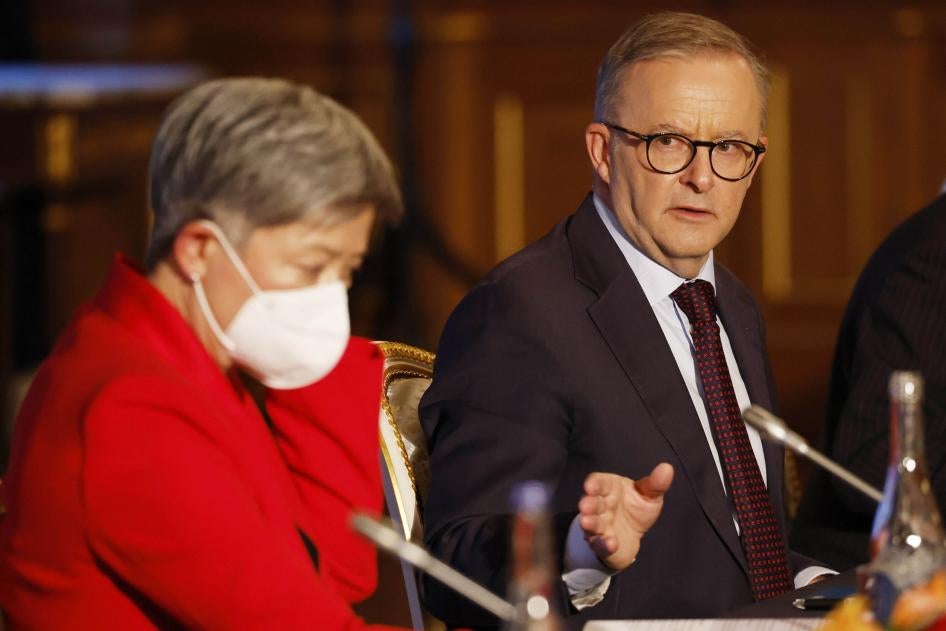(Sydney) – The Australian government should take firm action in response to further evidence that the Chinese government is committing crimes against humanity targeting Uyghurs and other Turkic communities in the Xinjiang region, Human Rights Watch said today. These actions should include imposing targeted sanctions, introducing legislation to prevent the import of goods made with forced labor, and leading efforts for accountability measures at the United Nations Human Rights Council session starting on September 12, 2022.
The groundbreaking UN report released on August 31 by the outgoing UN High Commissioner for Human Rights Michelle Bachelet, contained victim accounts that substantiate mass arbitrary detention, torture, cultural persecution, forced labor, and other serious human rights violations. It recommends that states, businesses, and the international community should take action with a view to ending the abuses and advancing justice and accountability.
“Australia should impose targeted sanctions against Chinese government officials who are implicated in crimes against humanity and other grave abuses against Uyghurs and other Turkic Muslims in Xinjiang,” said Sophie Richardson, China director at Human Rights Watch. “The European Union, US, UK, and Canada have already taken these steps, and Australia should join these efforts to hold those responsible for these abuses accountable and to stand with victims.”
In a coordinated effort in March 2021, the European Union, UK, US, and Canada imposed targeted sanctions, including travel bans and asset freezes, on senior officials in Xinjiang who have been accused of serious human rights violations against Uyghur Muslims.
In 2021, Australia passed “Magnitsky style” legislation that reformed Australia's sanctions framework, making it easier for the government to apply sanctions on those responsible for serious human rights violations and abuses, wherever they occur in the world.
Following the release of the UN high commissioner’s report, Australia’s opposition party, the Coalition, signalled that it would give bipartisan support for any “appropriately targeted sanctions” that the government of Prime Minister Anthony Albanese applied in response to human rights abuses in Xinjiang.
The government should also introduce legislation blocking the import of goods made with forced labor, both from Xinjiang and other locations inside and outside of China.
In the United States, the Uyghur Forced Labor Prevention Act, which came into effect in June, provides customs authorities increased powers to enforce an existing ban on imports linked to forced labor. The new law creates a presumption that any goods made in whole or in part in Xinjiang or produced by entities in China linked to forced labor cannot be imported into the United States. Companies can only rebut this presumption if they provide “clear and convincing evidence” that goods are free from forced labor, a nearly impossible bar to clear given the difficulty of conducting human rights due diligence in Xinjiang and in China more broadly.
Canada also prohibits the imports of goods produced wholly or in part by forced labor, and in January 2021 announced intensified efforts to prevent businesses from being complicit in, or profiting from, human rights violations in the Xinjiang region.
The United Kingdom has also introduced measures that include guidance to British businesses on the risks faced by companies linked to Xinjiang, advice for public bodies on excluding suppliers if there is evidence of human rights abuses in their supply chains, a review of export controls to Xinjiang, and fines for companies that fail to publish statements describing their efforts to eliminate forced labor in their supply chains.
When asked about the UN report on Xinjiang, Australian Foreign Minister Penny Wong said on September 6 that she is focused on improving Australia’s Modern Slavery Act to “ensure we don’t promote, we don’t condone and we don’t financially support forced labor.” While the government’s review of the Modern Slavery Act could lead to positive developments, it will not be completed until March 2023. The Modern Slavery Act should be strengthened to make it mandatory for businesses to identify and address forced labor and other human rights risks in their own operations and their global value chains, Human Rights Watch said.
Human Rights Watch urged the Australian government to pass new legislation prohibiting forced labor that designates Xinjiang a region where forced labor risks are high, and to introduce a presumption of forced labor for imports made in whole or in part in Xinjiang.
Last year the then-opposition Australian Labor Party voted in the Senate to support a bill introduced by independent Senator Rex Patrick that would have banned the importation of products made using forced labor.
Human Rights Watch also urged the Department of Foreign Affairs and Trade to provide clear guidance to Australian businesses about the risks of buying products from or investing in Xinjiang, particularly in highly exposed sectors such as clothing manufacturing and the solar panel industry. Australian companies should also be encouraged to join the “End Uyghur Forced Labour Call to Action.”
Australia should also lead efforts at the UN Human Rights Council’s upcoming session to establish an independent investigation into China’s abuses in Xinjiang, taking all measures necessary to advance accountability and provide Uyghurs and others the justice they are entitled.
“The Australian government should turn words into action to help Uyghurs and other oppressed communities in Xinjiang,” Richardson said. “Australia should stand side by side with a growing global coalition of nations that will not allow Chinese government crimes against humanity to go unpunished.”









